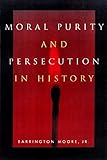Moral Purity and Persecution in History / Barrington Moore.
Material type: TextPublisher: Princeton, NJ : Princeton University Press, [2021]Copyright date: ©2000Description: 1 online resource (192 p.)Content type:
TextPublisher: Princeton, NJ : Princeton University Press, [2021]Copyright date: ©2000Description: 1 online resource (192 p.)Content type: - 9781400823468
- 323.44/2/09 21
- BJ1533.P97 M66 2000eb
- online - DeGruyter
| Item type | Current library | Call number | URL | Status | Notes | Barcode | |
|---|---|---|---|---|---|---|---|
 eBook
eBook
|
Biblioteca "Angelicum" Pont. Univ. S.Tommaso d'Aquino Nuvola online | online - DeGruyter (Browse shelf(Opens below)) | Online access | Not for loan (Accesso limitato) | Accesso per gli utenti autorizzati / Access for authorized users | (dgr)9781400823468 |
Browsing Biblioteca "Angelicum" Pont. Univ. S.Tommaso d'Aquino shelves, Shelving location: Nuvola online Close shelf browser (Hides shelf browser)

|

|

|

|

|

|

|
||
| online - DeGruyter Revolutionary Politics and Locke's Two Treatises of Government / | online - DeGruyter The Furies : Violence and Terror in the French and Russian Revolutions / | online - DeGruyter Campaign Talk : Why Elections Are Good for Us / | online - DeGruyter Moral Purity and Persecution in History / | online - DeGruyter Law's Order : What Economics Has to Do with Law and Why It Matters / | online - DeGruyter The New Social Question : Rethinking the Welfare State / | online - DeGruyter The Sacred and the Secular University / |
Frontmatter -- Contents -- Preface -- CHAPTER 1 Moral Purity and Impurity in the Old Testament -- CHAPTER 2 Purity in the Religious Conflicts of Sixteenth-Century France -- CHAPTER 3 Purity as a Revolutionary Concept in the French Revolution -- CHAPTER 4 Notes on Purity and Pollution in Asiatic Civilizations -- Epilogue -- Notes -- Index
restricted access online access with authorization star
http://purl.org/coar/access_right/c_16ec
The intellectual scope and courage to contend with the largest puzzles of human existence and organization distinguish great social thinkers. Barrington Moore's Social Origins of Dictatorship and Democracy was a foundational work of historical sociology that influenced a generation of social scientists and, decades later, continues to be widely read and taught. Here, Moore takes up the same tools of historical comparison to investigate why groups of people kill and torture each other. His answer is arrestingly simple: people persecute those whom they perceive as polluting due to their "impure" religious, political, or economic ideas.Moore's search begins with the Old Testament's restrictions on sexual behavior, idolatry, diet, and handling unclean objects. He argues that religious authorities seeking to distinguish the ancient Hebrews from competing groups invented, along with monotheism, the association of impure things with moral failure and the violation of God's will. This allowed people to view those holding competing ideas as contaminated and, more important, contaminating. Moore moves next to the French Wars of Religion, in which Protestants and Catholics massacred each other over the control of purity, and the French Revolution, which perfected terror and secularized purity. He then combs the major Asian religions and finds--to his surprise--that violent efforts to eradicate the "impure" were largely absent before substantial Western influence.Moore's provocative conclusion is that monotheism--with its monopoly on virtue and failure to provide supernatural scapegoats--is responsible for some of the most virulent forms of intolerance and is a major cause of human nastiness and suffering. Moore does not say that the monotheist tradition was the primary source of Nazism, Stalinism, Maoism, violent Hindu fundamentalism, or ethnic cleansing in Rwanda and the former Yugoslavia, but he does identify it as an indispensable cause because it justified, encouraged, and spread vindictive persecution throughout the world.Once again, Moore has drawn on his comprehensive understanding of history and talent for speaking directly to readers to address one of the most crucial questions about human past and future. This book is for anyone who has ever heard the word genocide and asked why.
Mode of access: Internet via World Wide Web.
In English.
Description based on online resource; title from PDF title page (publisher's Web site, viewed 29. Nov 2021)


